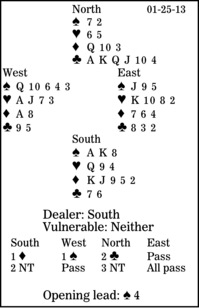Bridge column, January 25: The same rule is for later leads

R.K. Milholland, an author of Web comics, said, "Friendship is being there when someone's feeling low and not being afraid to kick him."
That would work with a lot of people, but would make some feel even worse.
We "kick" partner by leading a low card from a long suit to tell him that we have at least one honor in it. And this applies during the play if a defender shifts to a suit not yet led by either side.
Here is a classic example. West leads the spade four against three no-trump. South captures East's jack with his king and plays a low diamond. What should happen next?
West was right to overcall one spade, not to make a takeout double. He was hoping to introduce hearts on the next round if it seemed expedient.
South has eight top tricks: two spades and six clubs. He needs one diamond trick to get home. And it is usually best to try to sneak an extra winner immediately, while the defenders are still half asleep.
However, an awake West knows from the first trick that South has the spade ace and king. Why isn't declarer running for home? He must be trying to get a ninth trick. So West must win with his diamond ace and shift to the heart three. This low card says that West has honors in hearts and is trying to win tricks in this suit. East should take the trick with his king and return the heart two, not go back to spades.
If West had begun with ace-10-fifth of spades and had wanted East to return a spade, West would have led a high heart, not his lowest.
** ** **
COPYRIGHT: 2013, UNITED FEATURE SYNDICATE
DISTRIBUTED BY UNIVERSAL UCLICK FOR UFS

